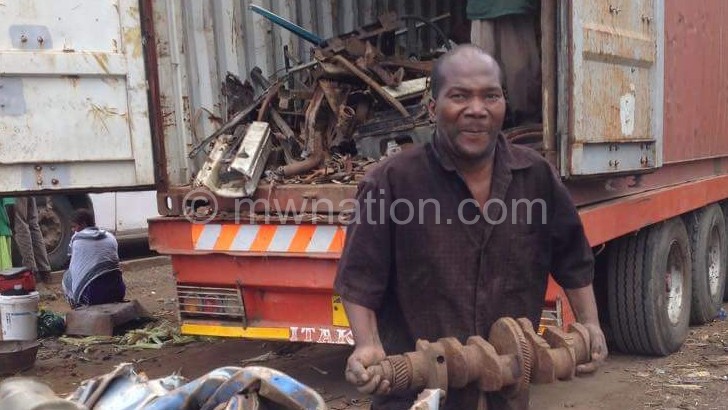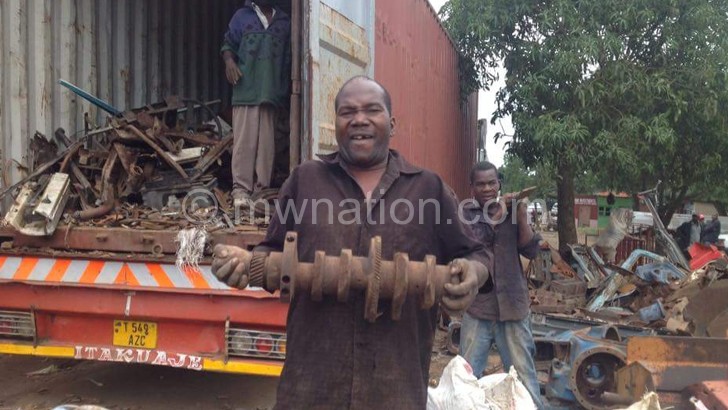Thriving scrap metal market: the good and the bad
For a decade now, Malawi has seen a boom in scrap metal industry. Moving around towns and cities, one never fails to notice securely guarded piles of metal trash along the roads or trucks loaded with metal pieces.
Scrap metal collectors are always on the move. They would salivate upon seeing non repairable vehicles parked in the neighbourhoods.
These people collect scrap for cash to scrap metal dealers located in strategic places in the country’s cities.
There is now a scramble for the trash that used to be an eyesore in the country’s cities and towns less than two decades ago.
Scrap metal collectors

Evance Chidyaudzu is one of the local scrap metal dealers based in Luwinga, Mzuzu. His days are spent in the villages of the northern part of Malawi scouting for metal. He started his business in 2008 after being jobless for one year.
A Grade 1 mechanic, Chidyaudzu found himself in a helpless condition after being kept in custody at Rumphi Police for two months for allegedly buying a vehicle without valid papers.
The garage with close to 32 vehicles that he was operating before his arrest was in ruins.
But the tables turned when one Kenyan man approached him to purchase all the remaining scrap vehicles.
“He offered to buy everything at K300 000. I then started collecting scrap for him,” he narrates.
Chidyaudzu says he became inquisitive and did a market research.
From 2009 he had been collecting scrap and illegally exporting it to Dar es Saalam in Tanzania using unchartered routes as the country’s laws prohibited metal exports.
Containers loaded with metal were passing through the Nyika-Chitipa Road and connecting to Songwe in Karonga .
“From there we were smuggling the pieces to Tanzania in minibuses,” he explains.
He has 12 boys on his payroll scrambling for the precious material.
“I have cleared the city of Mzuzu of scrap metal, now we have gone into other districts of Nkhata Bay, Mzimba and Rumphi, penetrating the very remote areas,” he says.
Government lifted the ban 2014 after the country witnessed phenomenal piles of the metal according to Ministry of Industry and Trade spokesperson, Wiskes Mkombezi.
While the ministry issues the export permit free of charge, Chidyaudzu use middlemen to access the permit at a fee of K250 000.

Scrap market
Although other scrap metal collectors sell a small chunk domestically to tinsmith and miller fabricators, a big percentage of Malawi’s scrap metal is exported to South Africa and Tanzania.
Statistics show that in the last decade the price of metal has gone one way and that’s up. Metal prices have risen between 400-500 percent. As an example, copper, which was trading at $1 500 per ton in 2001, is now trading in excess of $8 500 a ton.
The rise in copper prices makes it the most attractive metal to steal as demand for it is huge. Industry experts blame China’s growth for the unprecedented rise in metal, especially copper. China in 2011 consumed as much copper as Japan, North America, Europe and Russia combined.
Chidyaudzu says he invests close to K1.5 million in metal fitting a 30 ton export container and makes a profit of about K400 000 from the sales. In a year, he exports about 300 metric tons.
However Chidyaudzu notes that it is becoming difficult to find scrap metal.
General Secretary for central region scrap metal dealers association (CRSMDA), Alexander Phodogoma, says Tanzania offers a stable market. Out of a supply of 30 tons he says the dealers make a profit of about K350 000.
“The market has been vibrant from 2007, we used to sell scrap metal to a certain company in Blantyre where they smelt,” he narrates.
As the Mzuzu City Council’s Felix Namakhuwa says: “The boom of scrap metal business has cleaned up our city; we used to have pile ups.”
Vandalism

But the scramble for scrap metal has also led to wanton destruction of road furniture, electricity and telephone cables, guard rails, fibre optic cables and public infrastructure.
Thieves look at metal theft as easy way of making quick and easy money.
Malawi Telecommunications Limited (MTL) and Electricity Supply Corporation of Malawi (Escom) are the major victims.
MTL’s corporate affairs manager Tina Das says dealers are taking advantage of the lift in banning metal exports to vandalise the company’s copper wires.
“We have had our cables being smuggled to South Africa and Tanzania in the name of exporting scrap metal,” Das says.
She narrates of an incident where some offenders connived with the company’s security guards to steal copper cables from its warehouse.

led to vandalism
“Fortunately we were tipped and they were apprehended on their way to South Africa,” she says.
On his part Escom’s Systems operations and power trading manager Patrick Kadewa says the company is negatively affected as thieves vandalise its cables, power lines and transformers.
He says as the metal theft is on the increase the utility company is failing to cope.
“We are investing in the same infrastructure repeatedly instead of investing in other expansion works,” Kadewa says.
He says the company is working hand in hand with the law enforcing agencies to apprehend and punish the offenders. The two companies are now in a joint venture to combat vandalism.
Phodogoma says his association is playing a big role in fighting against the same.
Contrary to the general view that the vandalised metal ends in the hands of the dealers, Phodogoma says CRSMDA members do not purchase any of it.
“Imagine, we even fund campaigns on sensitising the public against it,” he says.
Phodogoma pleads with the public to look at the positive side of scrap metal business as it also cleans up the environment.
While Chidyaudzu says there is no way he can export vandalised property as officials from the Ministry of Industry and Trade and police inspect the containers before exporting them.
Government’s Intervention
To contain vandalism government issued a ban on its export around the year 2008.
Ministry of Industry and Trade spokesperson Wiskes Mkombezi says it was banned because the Second-hand and Scrap Metal Dealers Act had no requirement of inspection.
“During that time vandalism was high,” he narrates.
However, the ban was lifted in 2014 as stocks piled up.
Mkombezi says apart from inspecting the export containers before leaving their premises, they are also inspected at the country’s exit points.
“We do this to make sure that our electricity and communication cables do not find their way on the market; When applying for permit, the dealers specify the tons to be exported,” he explains.
To Mkombezi these dealers do not involve themselves in vandalism as their business life is attached to the export permit.n





